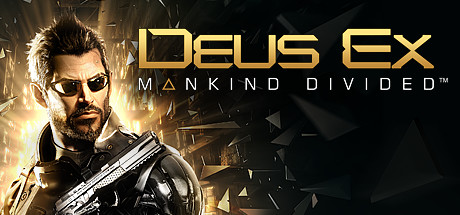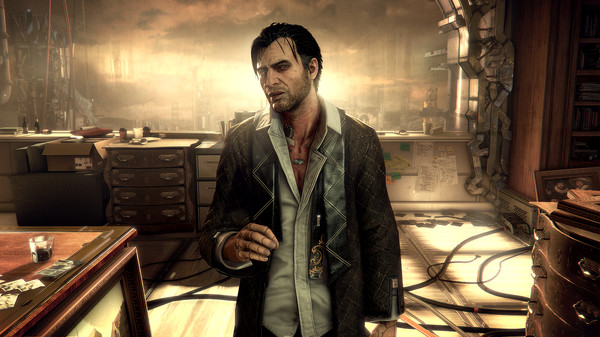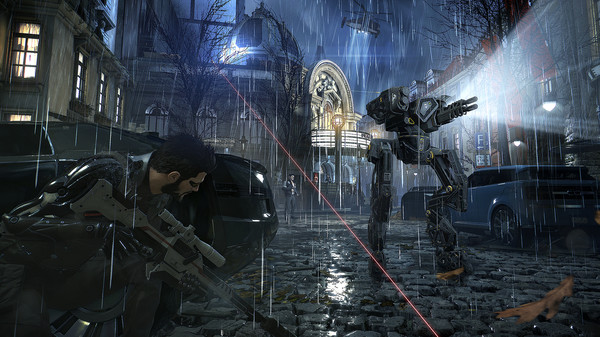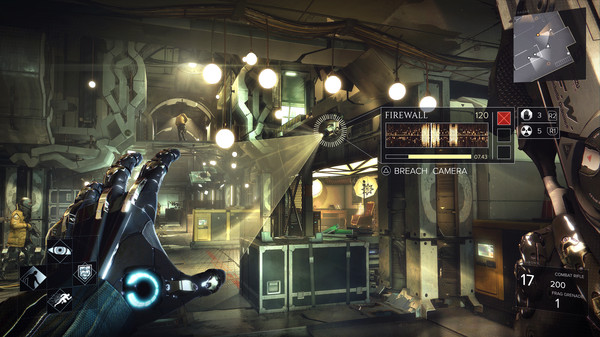Deus Ex: Mankind Divided - Review

Deus Ex does its best to raise interesting questions about morality, humanity, and authority in its newest installment. Back in the shoes of Adam Jensen, you work as an agent of a secret government task force that tackles terrorism. Since the end of Human Revolution and The Aug Incident, augmented people have experienced systematic oppression and injustice, and a group has sprung out of the anger that it has caused. The Augmented Rights Coalition (ARC) is suspected of bombing a train station and you must investigate, while at the same time attempting to find out what happened to you in the aftermath of the incident on Panchaea. Someone tinkered with your augs, unlocking powerful new abilities of you to play with, on top of the same compliment of powers from the previous game that you are already familiar with.
It is a story very much ripped from the headlines, with abuses of police authority, racism, and “Aug lives matter”. They want to elicit a certain reaction out of you, but they seem to fall short in their attempt at making a broad social point that the entire game builds to. The story starts small and stays that way, even while constantly talking about a bigger conspiracy. The plot revolves around finding the perpetrators of the train station bombing, and by the end of the roughly fifteen to twenty hour campaign, you have found your villain. But too many questions are asked and never answered, and the world-reaching story of Human Revolution feels massive in comparison.

At the same time, the world that they have created is one that I want to play in. The environments are interesting, and the locations that you go to are varied enough that you stay interested. The side missions that they have peppered throughout the main story are definitely the highlight, and the attention to detail and the optional story that they have built in is intriguing. You genuinely don’t know where some of them will end up, and the twists are well executed.
I wish I could say the same about the main story. The one big twist in the game doesn’t come until the credits, and even then feels like more of a teaser for the next installment than anything that is actually relevant to the story. Most of the main missions of the game boil down to large rooms filled with enemies that you have to cross in one way or another. Turn on your gamer vision, in this game taking the form of your augmented eyes, and look for a vent or a terminal that you can hack. Sneak by enemies, tranq a few, and move on. If you are shooting your way through, it is even easier, as a decent amount of skill with a gun can take you a long way, even after enemies become veritable bullet sponges in the later half. The movement and gunplay feels good, although I always had difficulty climbing into vents that were above other obstacles, constantly getting stuck on the environment.

The way in which you play the game will feel unique while you are playing it, but in the aftermath, the veneer can be peeled away. I went for a mixture of stealth and action. I would exercise lethal force, but only in the situations that I felt required it. Where there was a threat to someone other than myself. When it was just me, the stun gun would come out, and I could move quickly and silently through he level, dropping enemies before they could see me. I lived by the code that I assigned to my character, and it dictated the actions that I took. My Adam Jensen wouldn’t kill cops because he was a cop. He preferred to hack and sneak his way through levels.

The way you spec your character reflects that. I prioritized my hacking augments, then conversation augs. After that I mixed in others to help me through the level. It would be almost impossible to unlock everything in a single play through, and the powerful experimental augs can turn the table in a heartbeat, allowing you to tank enemy gunfire, slow down time, dash through the air, and more. They balance this out by only allowing you to activate a certain number at one time with risk of overcharging your circuits otherwise. If you activated one experimental aug, you had to disable another, permanently. Or at least until the latter half of the game, when the restriction is lifted.
The environment design was a bit of a let down outside of the hub city. I loved Prague, jumping through second story windows to dig into people’s emails, exploring the sewers, and hacking storage units to steal a gunrunners stock. But that just made the individual levels themselves more disappointing. There were options on how you could tackle each area, but they quickly became very obvious. Either find vents and sneak by everyone, maybe hacking a terminal or two on the way, or run and gun, or take the hard stealth route and try to dodge vision cones. It is what made the side missions so fun, because they took place in the hub city and you had options for what to do.
They make up for this by giving you decisions that actually seem to matter for once. From how you handle an abusive cop to the load out you bring into a mission to some very important story beats, there is choice in here that feels like choice, and you always wonder if there isn’t a third option. The game isn’t a binary black and white system. Make one choice or the other. You have a few of these options, but the story shines when there are actual shades of gray, where you battle against a clock and other challenges to try to win battles on two unwinnable fronts.
The content that is in the game, I wanted to see. Very little felt meaningless, and I didn’t feel overwhelmed by pointless side missions like I do in so many RPGs. The story itself fi rather short, and I wish there was more there. I felt like they were on the edge of something really interesting that they failed to explore, and could have selected in the gameplay. It tried too hard to scale back the action, to make a personal game. The plot, while interesting, felt like it was ripping a little too much form the headlines. You don’t so much choose your side as you would in another game; instead you simply sit on the sidelines and wonder who was right. Putting you in the place of the oppressor could have been interesting, and the game allowed few points for your character to be bad. It works, but it could be better. You feel like the cyber badass that is Adam Jensen, but hindered by the story that he is placed in. I just wish I could have stretched my wings.
3/5
Review written for the Xbox One version of the game. Your experience may vary on different platforms.
Our review code can be found here for information on how we write and score our reviews. If you have any questions, comments, suggestions, or concerns, please contact us at contact@deathofthecritic.com
_____________________________________________

Tom has been writing about media since he was a senior in high school. He likes long walks on the beach, dark liquor, and when characters reload guns in action movies.
You Might Also Like:
A Case Against Open World GamesLeft 4 Dead - A Love Story
Dishonored 2 - Review
_____________________________________________